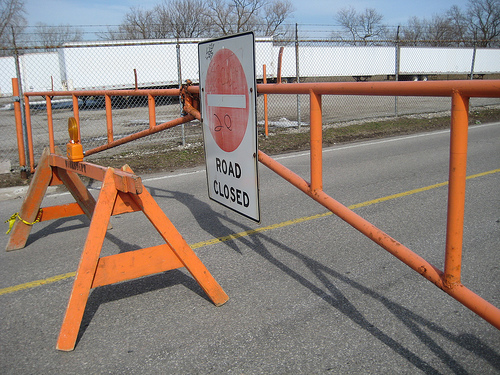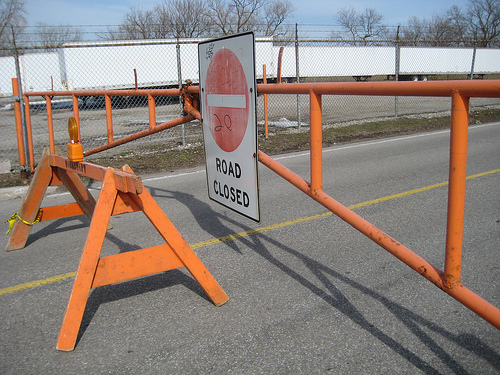 The GOP: permanent road block to legislative progress?Photo courtesy of natashalcd via flickr
The GOP: permanent road block to legislative progress?Photo courtesy of natashalcd via flickr
This article was cross-posted from the Center for American Progress.
Senate Majority Leader Harry Reid (D-Nev.) announced yesterday that he would scuttle plans to attempt to debate the Clean Energy Jobs and Oil Spill Accountability Act, S. 3663, which would remove the ridiculously low liability cap of $75 million for damages from the BP oil disaster and other offshore oil drilling blow outs. Reid had to pull the bill because he could not get a supermajority of 60 votes to allow debate on the bill to commence. He said that he tried “jujitsu and yoga” to gain Republican support but to no avail.
The Hill reported on his frustration due to the solid Republican opposition to removal of the liability cap so that oil companies must pay for the damages from their accidents:
But in announcing plans to push consideration of the bill until at least September, Reid said: “It’s clear Republicans were going to be determined to stand in the way of everything.
“It’s a sad day when you can’t find a handful of Republicans to support a bill” that holds BP accountable for spill liability and creates green jobs, he told reporters.
Nevertheless, Sen. Reid committed to continue to try to convince some Republican senators to support removal of the liability cap:
“In the interim, we will continue to work to get Republican votes for a strong bill that holds BP accountable, creates jobs, lowers costs and protects the environment. The Republicans have proposed an alternative. But Democrats can’t and shouldn’t vote for the Republican bill that doesn’t even hold BP accountable for the enormous economic damages it’s caused to Gulf Coast communities.”
Reid’s original plan to debate S. 3663 and have an up-or-down vote on it was thwarted by Republicans’ opposition to lifting the liability cap even though some of their colleagues voted for it in the Senate Environment Committee. Politico reports Republican leaders planned to amend the spill bill to death if it went forward for debate:
Staffers close to the Republican leadership said that if the bill had been left open for amendments, Republicans would have hijacked the debate with amendments designed to prolong partisan arguments and revive GOP attacks on the broader Democratic energy initiatives, including cap-and-trade climate legislation. Many said Republicans’ desire to use the energy debate to put Democrats on the spot on those issues closer to elections will prevail next month as well.
Ranking Senate Energy Committee member Lisa Murkowski (R-Alaska) is advocating a very limited liability scheme for future catastrophes instead of unlimited responsibility for blowouts and oil spills. Her plan would leave BP’s legal liability for the Deepwater disaster at $75 million even though the estimated cost could be $20 billion or more. She and others developed this plan with the American Petroleum Institute — the lobbying arm for big oil companies. Politico reports:
Oil industry representatives said they are indeed celebrating the death of the bill but are likewise gearing up for more fighting in the fall. “We’re glad to see that the Senate did not act on a bad bill with job-killing provisions,” said Jack Gerard, head of the American Petroleum Institute.
If this story sounds familiar, that’s because similar obstruction occurred last Thursday in the House of Representatives over efforts to provide assistance to first responders suffering from health problems contracted at Ground Zero in the aftermath of the World Trade Center attack.
Rep. Anthony Weiner (D-N.Y.) reacted angrily to Republican opposition to the James Zadroga 9/11 Health And Compensation Act, H.R. 847, during House debate on the bill. His speech was played numerous times, and thousands have seen it online. The mainstream media, as to be expected, focused on the theatrics of his outburst rather than the reason behind it.
Weiner was upset because some Republicans indicated that they were going to vote against H.R. 847 because it was brought up under suspension of the rules, which prohibits amendments but requires a two-thirds vote to pass. Here is his House floor speech:
It takes great courage to wait until all Members have already spoken and then stand up and wrap your arms around procedure. We see it in the United States Senate every single day when members say, ‘We want amendments. We want debate. We want amendments, but we’re still a no.’ And then we stand up and say, ‘Oh, if only we had a different process, we’d vote yes.’
You vote “yes” if you believe yes. You vote in favor of something if you believe it’s the right thing. If you believe it’s the wrong thing, you vote “no.”
If you believe this is a bad idea to provide health care, then vote “no.” But don’t give me the cowardly view that, ‘Oh, if it was a different procedure.’
H.R. 847 failed by a vote of 255-159, which is 22 votes shy of the two-thirds needed to pass the bill and move it to the Senate.
Greg Sargent of The Washington Post noted that Republican opposition to this and other bills is designed to score political points by making government look ineffective and then blaming the Democrats:
Whatever their substantive objections to each piece of legislation Republicans oppose, their larger game plan is to render government ineffective in order to deny Dems victories, create a sense that government is broken and has failed to deliver, stoke anti-incumbent fervor, and ensure that Dems bear the brunt of blame for government dysfunction.
This may indeed be the case. Both the Clean Energy Jobs and Oil Spill Liability Act and the 9/11 Health and Compensation Act are relatively noncontroversial. The former is designed to hold BP responsible for the biggest oil disaster in history and do the same for future
blowouts. The latter is meant to help courageous police and fire fighters suffering from health problems from the worst terrorist attack on U.S. soil. S. 3663 is composed of measures coauthored by Republicans. H.R. 847 had more than a dozen Republican cosponsors, but it received only 12 GOP votes.
Both of these bills should have easily passed given their subject matter and the fact that they had bipartisan support. But as Sargent notes, Republican leaders are determined to defeat such measures to help hone their argument that the Democrats are ineffective. The results of this strategy are shameful: Big oil companies can evade responsibility for their accidents while the taxpayers foot the bill for cleanup costs, and first responders must continue to suffer without assistance.
The losers in all of this? The American people.




